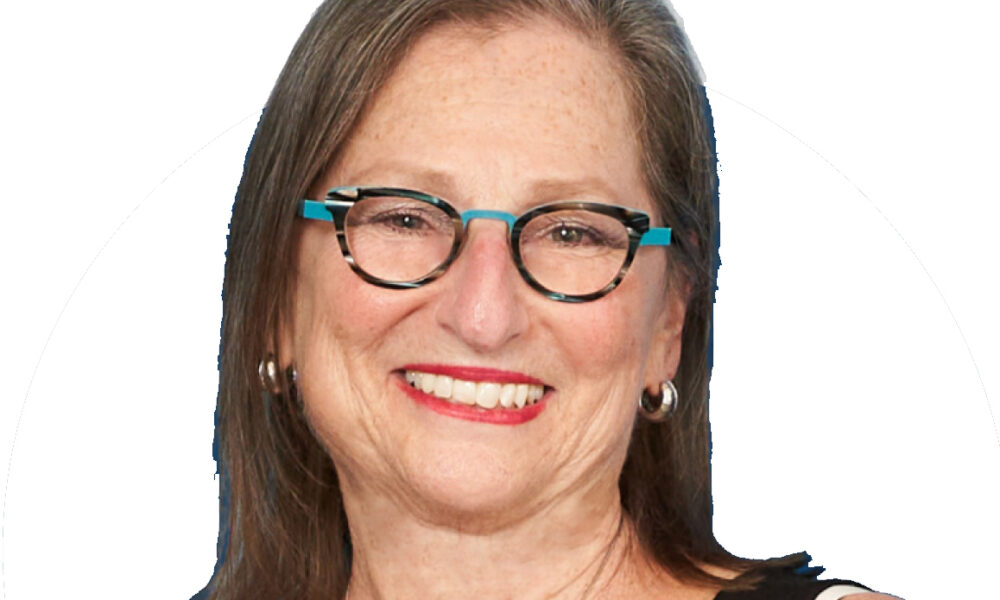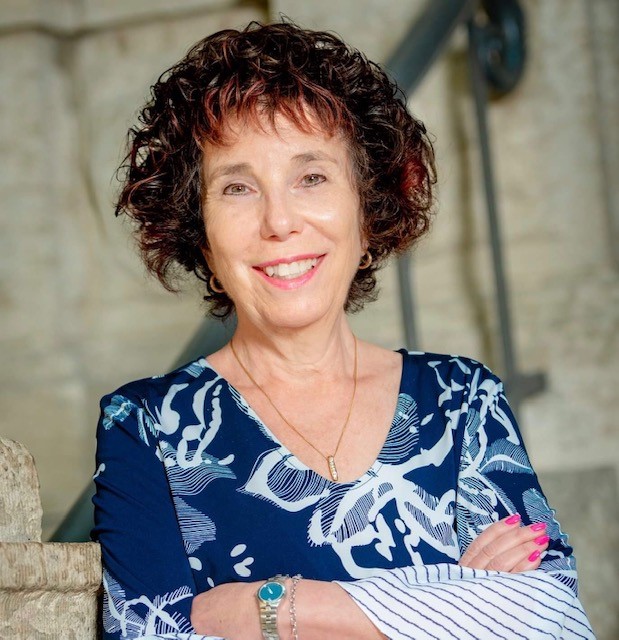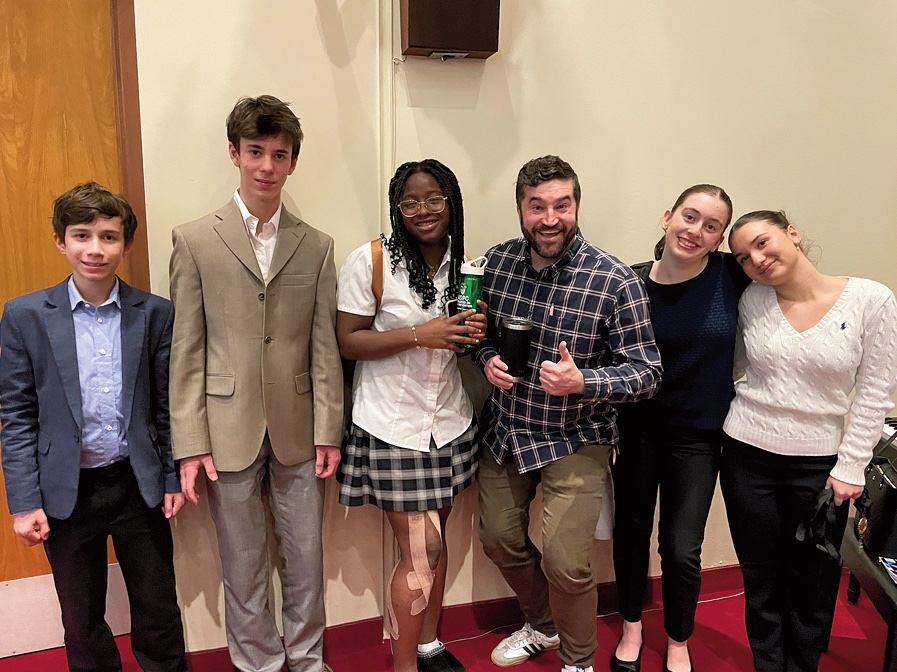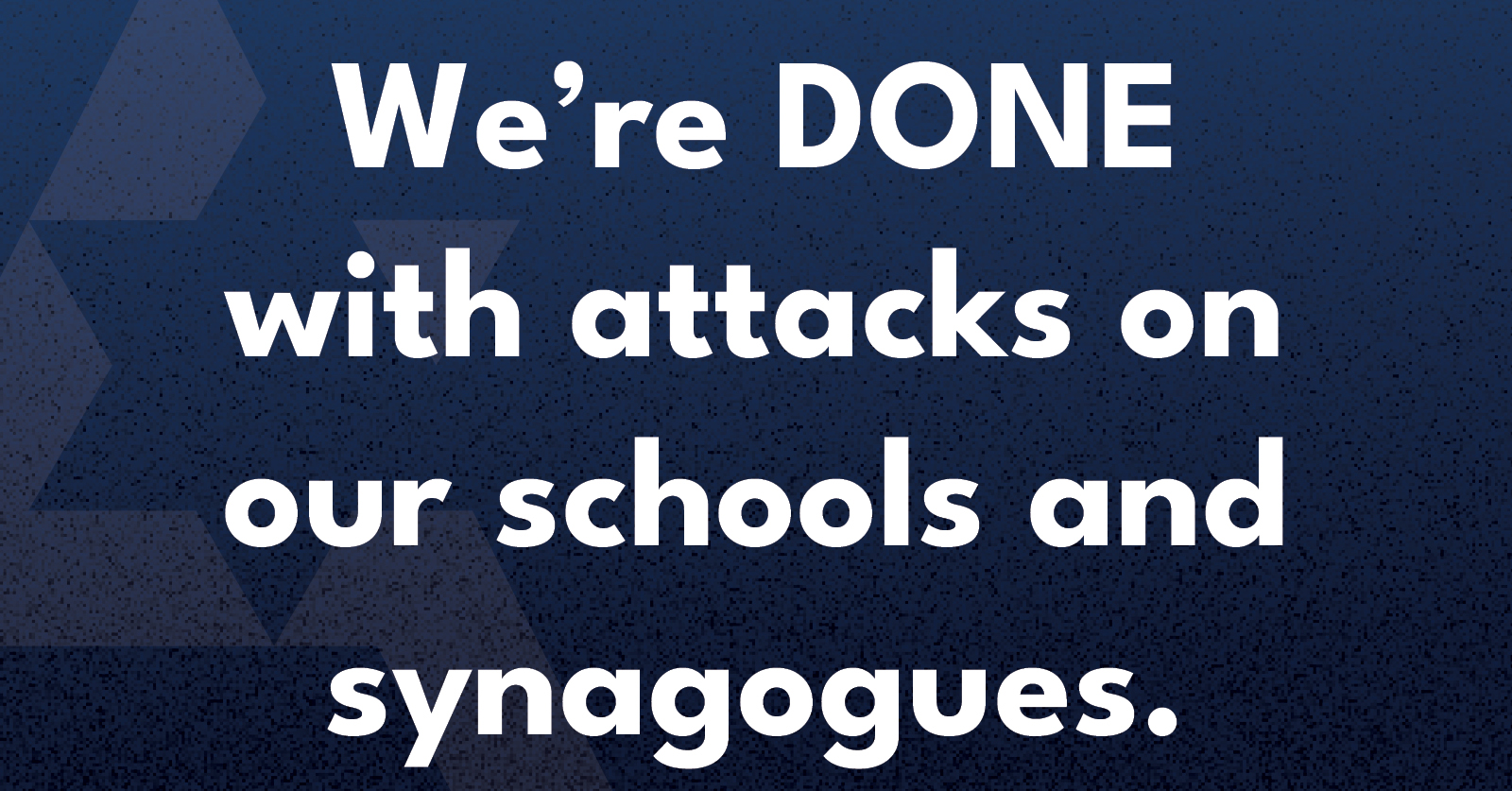Local News
Elaine Goldstine hounoured at JNF Gala; Stephen Harper opens up about his deep admiration for Israel

By BERNIE BELLAN It had been over 20 years since the Jewish National Fund had actually held a Negev Dinner in Winnipeg. After having used the Concert Hall as the venue for the annual JNF Gala for many years it was a little strange to be entering into the Convention Centre for this year’s affair instead.
But, it was the Convention Centre that was the setting for this year’s JNF Negev Gala on Thursday, May 11, when outgoing CEO of the Jewish Federation Elaine Goldstine was honoured. The fact that former Prime Minister Stephen Harper was also present – and engaged in a lively dialogue with interviewer Steven Kroft, added to the interest level for the some 900 audience members who were present. (By the way, although JNF Executive Director David Greaves referred to the sit down between Harper and Kroft as a session between“the two Steves”, I told Greaves that Harper dislikes being called “Steve.” I had read that years ago when he was first introduced to former US President George W. Bush. Bush liked to give everyone a nickname when he met them. Naturally, Stephen Harper became “Steve,” but our former Prime Minister was not tickled by that.)
In speaking about her being chosen this year’s Negev Gala honouree, Elaine Goldstine noted she had “chosen to allocate some of the funds raised tonight locally and I have chosen Shalom Residences” to receive a portion of the funds.
Anyone who knows Elaine would understand how true it was when she said her credo as CEO has been “Never close the door on anyone.”
And, following a lengthy speech from her husband Ian, who went on at some length describing how he and Elaine first met, along with quite a few stories about their lives together, Elaine demonstrated her wit when, in addressing Ian, she said: “We have been on this journey since I was 15 – as you told my entire life story.”
David Greaves introduced former PM Stephen Harper, saying to him: “It takes courage just being a mentsch to stand with those who stand alone. There has not been a friend to Israel like you ever.”
At that point “the two Steves” took their seats on the podium for what became a 35-minute back and forth during which Stephen Harper was at turns eloquent in describing his passion for Israel, insightful when discussing current situations in the world, and occasionally very funny as he related anecdotes from his past.
Steven Kroft began by asking Harper about the time he became the first Canadian Prime Minister to address Israel’s Knesset, in 2014. Kroft suggested “that speech is widely considered to be one of the strongest speeches in support of Israel by a non-head of state. He asked Harper to talk about his strong support for the State of Israel.
Harper responded that “one of the great honours of my life was to see the creation” of the Hula Valley Stephen and Laureen Harper Bird Sanctuary.
Then, Harper added this: “In Canada we don’t name things after living people so many people who visit the bird sanctuary assume I’ve passed away.”
Harper expounded upon how he came to develop such a strong affinity for the State of Israel, explaining that he “grew up in a household that supported Israel.”
But there was more to it than that, he explained: “I had another reason (to support Israel). Israel is a friend and an ally and is a part of the family of democratic nations. Israel faces the same threats as other democratic nations face, but Israel is much closer to those threats.
“Supporting Israel is unequivocally in the interests of this country and should be in the interests of all politicians,” Harper said.
“But I found that just about every politician is a friend of Israel when they’re speaking to a Jewish audience,” he observed.
Steven Kroft asked Harper whether “we should get worked up when Canada supports one of the resolutions at the UN that are critical of Israel?”
Harper answered that “those resolutions are pro forma and they’re not really indicative of what’s going on around the world. In that sense they’re not something to worry about… But what do you do when Western leaders go along with those resolutions? So what. I’m the only one who expressed an honest opinion.”
Kroft asked Harper what he thinks the impact of the Abraham Accords has been?
Harper suggested that the US and other Western countries have distanced themselves from Saudi Arabia – leading to Saudi Arabia broadening relations with China. He observed that “it’s tough for Saudi Arabia to be an ally of the Western world because we do nothing but criticize them.”
Harper noted a comment that had been made to him by an Arab diplomat, with reference to the behaviour of Western governments: “You sell off your friends and buy off your enemies.”
As far as the Abraham Accords are concerned though, Harper suggested that the leaders of the Arab countries that signed on to those accords (Bahrain, United Arab Emirates, Sudan, and Morocco) are interested in bringing their countries “into the modern world.” (Sudan seems to be going through a reversion to civil war, however, something that plagued that country for years. It will be interesting to see whether whoever emerges on top is going to want to remain in the Abraham Accords.)
Harper added this observation about the role that China is now playing in the Middle East: “The Chinese have been a real brake on Iran. They (the Chinese) want them (the Iranians) to live up to the accords they recently signed with Saudi Arabia.”
Yet, at the same time, Harper had this to say about Iran: “I worry more about Iran than any other country in the world because they believe in developing nuclear weapons so that can use them and Allah will come to their aid.”
Kroft asked Harper about “judicial reform” in Israel and whether what’s been happening with moves to weaken the judiciary have affected Israel’s credibility ? He also asked what advice Harper might have for Canadian Jews who want to express their opinions on Israeli government policy?
Harper responded: “Regardless what one thinks of what is going on in Israel today, one should be supportive of Israel…Only in Israel could you give a 100% pro-Israel speech (as Harper did when he addressed the Knesset in 2014) and be heckled by both the right and the left (in the Knesset).”
At that point Harper told a story that was very funny – and was based on a true experience that he had in 2017, after he was no longer Prime Minister.
He was in Australia and one evening he went to a bar with another former prime minister, John Howard, who had been PM of Australia. Who should walk in but another former prime minister, this time Bibi Netanyahu?
That led Harper to tell this joke, based on the conversation he had with Howard and Netanyahu that evening. (He explained that he was changing the story somewhat, substituting the Prime Minister of Great Britain for the Prime Minister of Australia):
Three former prime ministers gather together at a bar.
The former PM of Canada says: “I was prime minister of a country that had 30 million people.”
The former PM of Great Britain says: “I was prime minister of a country that had 60 million people.”
The former PM of Israel says: “I was prime minister of a country that had 8 million prime ministers!”
Kroft turned to the Russian invasion of Ukraine. He asked Harper “What is Putin like?”
Harper said that he had called for Russia’s expulsion from the G8 in 2014 when Russia first invaded Ukraine and seized Crimea.
He continued: “I’ve met many leaders, many businesspeople, many celebrities, but the one person – of all the people I’ve met, who I’m asked to say what he’s like, is Putin.
“It’s because he’s a real life Bond villain…But whenever he came to a meeting and walked into the room he was always extremely well prepared. In many ways he’s very impressive, but he’s also a very evil person.”
Harper went on to say that he hates “when people compare democratically elected leaders with dictators.” He said that, back in 2008, when George W. Bush was President of the US, he and Bush were “prepared to bring Ukraine into NATO, but others weren’t…The failure to do that,” he suggested, “led to the Russian invasion of Ukraine.
“There is strength through deterrence,” he added.
“How is it (the war in Ukraine) going to end?” Kroft asked.
“What enough people don’t understand,” Harper responded, “is that Ukrainians are prepared to fight to the last man. They know that the moment they give up they’re going to get slaughtered.”
He also noted that the Government of Canada “should be very proud” of the support it’s given Ukraine. “We did a large amount of the training of their army,” Harper noted.
However, Harper predicted that the war “will go on for a very long time. Putin understands that if he’s not the strongest man in Russia, then he’s a dead man.”
Kroft turned to the subject of anti-Semitism, asking “How is it different today?”
Harper suggested that anti-Semitism was increasing even as far back as when he was Prime Minister. “The fragmentation, the polarization” in society have been contributing factors, he observed, along with the spread of hate on social media.
Nonetheless, he said that he was “optimistic about it (a decline in anti-Semitism) in the long term, but it’s exposed to us the complexity of public opinion. Social media has unleashed a voice that was always out there…What worries me more,” he suggested though, “is the rise of global jihadism.”
Further, Harper said that what “worries me the most is the anti-Semitism that has come out of the left – out of academia, that had led to the BDS (Boycott, Divest, Sanctions) movement.
“The difference is that it (anti-Semitism on the left) tends to make anti-Semitism intellectually respectable. Let’s be under no illusion what it really is…
“By any standard of freedom, of democracy, and of justice, Israel is one of the freest countries in the world.”
And then, with a reference to the protesters who were outside the Convention Centre protesting against the Jewish National Fund, Harper said: “The people outside are not protesters, they’re haters.”
That’s about as unbiased a report that I could write about what Stephen Harper had to say at the Negev Gala. Did I agree with everything he said? No, but the audience sure loved it.
Local News
Cheryl Hirsch Katz, Jewish Child and Family Service’s longest serving staffer, set to retire at end of the month

By MYRON LOVE “I loved working at Jewish Child and Family Service,” says Cheryl Hirsh Katz, who is due to retire at the end of June. “I have always appreciated the warm and welcoming atmosphere here. I feel that the people working here are my extended family. I am going to miss my colleagues”.
“I have derived great satisfaction over the years to have been able to help many people in our community of all ages through my work at JCFS,” she continues.
After 44 years at the agency, Katz, the longest-serving member of the staff, was given an appreciative send-off at the JCFS’s recent (June 23) Annual General Meeting at the Shaarey Zedek Synagogue.
The daughter of Art and Bess Hirsh, Cheryl grew up in Garden City. She attended Peretz School, then Jefferson Junior High and Garden City Collegiate. She joined the staff of JCFS in 1981, shortly after receiving her Bachelor of Social Work degree.
She earned an MSW in 1990.
“I chose to become a social worker,” she recalls, “because I always wanted to be able to help people.”
Katz was originally hired by JCFS to work with newcomers. After a couple of years, she was given responsibility for looking after the needs of older adults.
“I really enjoyed working in older adult services,” she says. “That is where I spent the bulk of my time at JCFS.”
After ten years as a case worker, she was promoted to a supervisory role. Later, she was also given responsibility for mental health and addictions programming and settlement services, while keeping the older adult files under her purview.
“As a supervisor, I wasn’t directly involved with individual clients,” she points out. “I was more involved with programming. Among the programs for seniors we organized were – for example – sessions on elder abuse, digital storytelling and memory loss.”
She notes that one of the trends she has seen over the last 44 years is that people are living longer and living in their homes longer. A lot more of our clients are living well into their 90s,” she observes. “We have had to continually expand our staff and the services we provide in order to accommodate the growing demands of an aging population.”
She also spoke of the mental health needs of seniors and aging Holocaust survivors.
She says that she has mixed feelings about leaving JCFS. “After so many years working full time, I am going to have to create a new routine,” she comments.
She notes that, now that she is retired, she will have more time to spend with her parents – who are in their 90s.
And then, there are the two dogs to look after. “I will have time now to try new activities,” she says. “ I might learn to play mah-jong.”
She speaks about maybe doing some traveling – although her husband, Murray, is still working full time.
(She and Murray have one daughter, Farah.)
“Retirement may also include some volunteering,” she adds.
It is quite likely, she will be continuing her association with JCFS but in a volunteer capacity.
Local News
Gray Academy students shine in provincial, national debating competitions

By MYRON LOVE It has been another good year for Gray Academy’s high school students who participated in provincial and national debating competitions. The best results were recorded by Grade 9 student Noa Mednikov, who finished fourth overall nationally, fourth in interpretive reading, and fifth in persuasive speaking at the junior National Public Speaking Championship in early May in Vancouver.
Last October, in the Junior Provincial British Parliamentary Championship – which was held at St. John’s-Ravenscourt – Noa and her partner, Raya Braunstein, finished third as a team while Raya placed third in individual debating.
Their fellow Grade 9 student Maxim Moscalenkov tied for first in persuasive speaking in Vancouver, while the Gray Academy team of Gabe Tapper and Aaron Koplovich finished fifth. Aaron also finished fifth in his individual debate.
Earlier, in March, Maxim finished fifth in the Provincial Juniors debating competition, which was held at Balmoral Hall He and his debate partner, Nate Shenkarow, finished seventh among the teams entered. Last November, he and partner, Ethan Tenenbein, finished seventh in the Junior Prepared Tournament – just behind the Gray Academy team of Nate Shenkarow and Jack Kay.
At the senior high level in that competition, the team of Jacob Tenenbein and Jonah Novoseller finished fourth and Jacob was recognized as fifth best in an individual capacity. Jonah and Jacob also paired up to win the Asper Cup, which was held at their home school.
Jacob represented Manitoba at the Junior National Speech Championship in Vancouver in May and, last October, he and Grade 12 Gray Academy students Julie Krozkin and Daniel Bokser represented Canada at an international debating tournament in Bermuda.
Gray Academy’s debating program was introduced by Linda Martin in 2003. She also led the debating teams at Balmoral Hall. In 2011, Martin was succeeded by Gray Academy high school English teacher Andrew Kaplan.
“Andrew has done a wonderful job with the debating program” says Martin, who has a debating trophy at Gray Academy named in her honour, as well as a provincial trophy for best individual junior debater. “Over the years, Gray Academy students have done very well in many local, national and international competitions,” she adds.
About three weeks ago, this writer had the opportunity to sit down with Andrew Kaplan and six of the school’s top debaters while they discussed the benefits of learning how to debate. According to Noah Strauss – who competed in the Junior Provincials at Balmoral Hall in March, public speaking leaves him with a feeling of accomplishment.
“It’s a good skill set to have,” he observes. “It builds confidence.”
“A benefit of being able to debate is that you learn how to convince people that you know what you are talking about,” adds Maxim Moscolenkov.
Raya Braunstein notes that being able to debate is a skill that she expects to be helpful in many university courses which she may choose to take.
As Andrew Kaplan notes, the ability to express yourself has a great impact in whatever career you choose to pursue.
He points out that debating is compulsory at Gray Academy for all Grade 7 and 8 students – and students can continue debating as an option in the higher grades
Of course, competitive debating is not for everyone. For those students who opt to take that path, the journey begins with internal school debate competition – with the top debating teams and individuals qualifying for local tournaments and – potentially – beyond.
Andrew Kaplan reports that a small number of high schools in Winnipeg and southern Manitoba have active debating programs – including St. Johns Ravenscourt, St. Paul’s High School, St. Mary’s Academy, Garden City and Maples Collegiates in the Seven Oaks School Division, St. Maurice (a Catholic School), as well as Morden Collegiate and Dasmesh, a Sikh private school.
Kaplan expresses his appreciation to the Asper Foundation and an endowment spearheaded by the Kives Family for providing funding for the Gray Academy debating program – as well as the Andrew Slough Foundation – which was established by his friends in memory of the outstanding former Ravenscourt student debater and lawyer who passed away suddenly two years ago at the still young age of 38.
I am confident that our Jewish community can look forward to the continued success of Gray Academy’s star debaters and to the continual emergence of future stars as the times goes by.
Local News
Antisemitism has crept into grade school in Canada

Antisemitism in Canada has moved beyond protests and politics; it is now entering classrooms and altering how Jewish children see themselves functioning within them.
A a university student I have observed the experience of my younger brother in grade eight as a Jewish student. Over the past few months, his school has been at the center of several deeply troubling incidents that have made him feel unsafe in our parks, community, and even his school. Swastikas were drawn around the community, in parks and ponds. Additionally, an older man, who claims to be a pro-Palestinian influencer, stood outside his predominantly Jewish school wearing a keffiyeh, filming a video which then circulated between students on TikTok.
This same man later showed up to our local Jewish community center in keffiyeh to allegedly watch his son play basketball where my brother and many of his classmates go for their lessons, basketball games, and Jewish events. These moments made him and his peers feel watched and targeted just for being Jewish. Local political representatives condemned the incidents and raised awareness about antisemitism, but the fear among students didn’t go away. The feeling of being targeted for simply existing has been taught to my brother, something my parents had tried their hardest to escape from.
Most recently, my brother was chosen to represent his school at a regional science fair. When one of the judges arrived wearing a keffiyeh, he froze. For many, including my brother after the incidents he has faced, the keffiyeh represents a political message. But even more so for my younger brother, it is tied to the fear and intimidation he had already experienced. He felt nervous, distracted, and unsure of how to act.
This is not about silencing political expression. It is about a child who came to share his ideas and left feeling uncertain and afraid. It is about the atmosphere forming in Canadian schools, where Jewish students are being made to feel targeted and unwelcome.
His school made an effort to address the incidents, but the impact is lasting. Posts on social media, much can be very vague at times about inclusion cannot fully undo the feeling of being singled out. A kind word from a teacher does not erase the fear that builds when threats are left unspoken but deeply felt.
I am writing this as a sister who watched her younger brother lose a moment that should have been filled with confidence and pride. He deserved to feel safe. So do all Jewish students in this country.
Moving forward, schools must take concrete steps to protect all students. Antisemitism cannot only be addressed when it becomes violent or overt. It must also be recognized when it appears as intimidation, symbolic targeting, or political messaging that creates fear among students. Children should never have to question whether they are safe in their own classrooms or community spaces.
Events that are meant to support and celebrate students must remain focused on them. Individuals who feel the need to bring political symbols or messages into school grounds or children’s events should not be welcomed in those spaces. Schools must make it clear that their environments exist to support learning, safety, and inclusion, not to host agendas that can intimidate or isolate students.
Administrators and educators must develop clear guidelines for identifying and responding to antisemitic behavior in all its forms. This includes strengthening security measures, offering ongoing staff training, and engaging directly with Jewish families to understand their concerns. Inclusion is not a one-time statement. It is a responsibility that must be reflected in everyday decisions and actions. No child should ever feel unsafe or unwelcome because of their identity.
The author is a Campus Media Fellow with HonestReporting Canada and Allied Voices for Israel who lives in Toronto.
